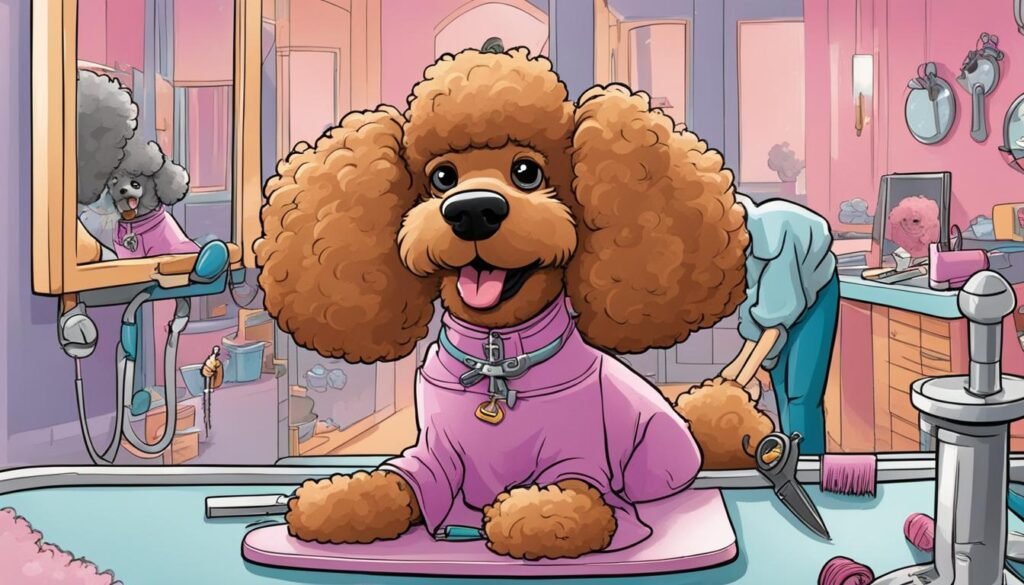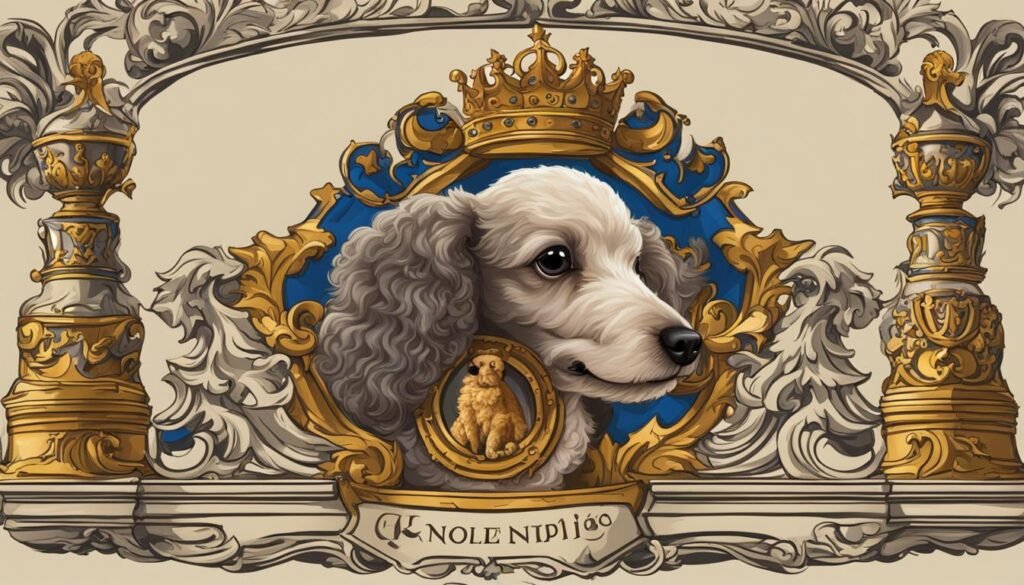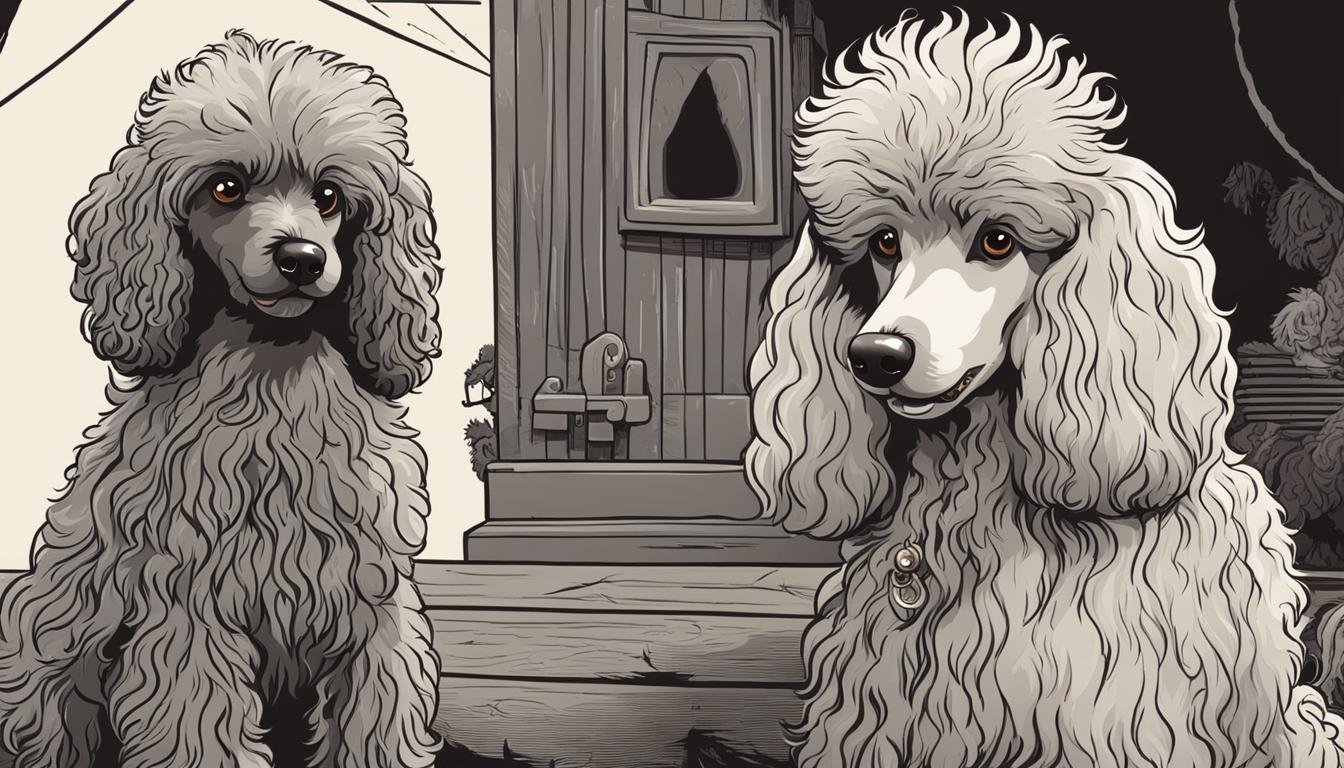Poodles are often regarded as intelligent and stylish dogs, but there are several reasons why some people consider them the worst. Despite their reputation, poodles have negative aspects that can make them challenging pets for certain individuals.
Poodles can be emotionally sensitive, easily startled, and prone to developing gastrointestinal issues or neurotic behaviors. This can make them less suitable for individuals who prefer a low-energy, lap dog. Additionally, poodles have several health issues, including Addison’s disease, hip dysplasia, epilepsy, and Cushing’s Disease.
While it’s important to consider the individual traits and needs of each dog, let’s explore the challenging traits and disadvantages that some poodle breeds possess.
Key Takeaways:
- Poodles have negative aspects that make them unsuitable for some individuals.
- They can be emotionally sensitive and prone to developing health issues.
- Poodles require proper training, socialization, and grooming to be good pets.
- Despite their challenges, poodles have positive attributes and can make excellent companions with the right care.
- Understanding the specific needs of poodles is crucial for a successful ownership experience.
Challenging Traits of Poodles
Poodles are known for their intelligence and elegance, but they also possess certain traits that can make them challenging pets. Understanding these traits is crucial for potential owners to make an informed decision about whether a poodle is the right fit for their lifestyle.
Emotional Sensitivity
Poodles are emotionally sensitive dogs, which means they can be easily affected by changes in their environment or routine. Loud noises, chaotic situations, and even subtle shifts in their surroundings can cause them to become anxious or stressed. It’s important for poodle owners to create a calm and stable environment for their pets and provide plenty of reassurance and comfort when needed.
Mental Stimulation and Physical Activity
Poodles have a high level of intelligence, which requires mental stimulation to keep them engaged and prevent boredom. Without adequate mental stimulation, poodles can become restless and exhibit destructive behavior. They also require regular exercise to maintain their physical health. Daily walks, playtime, and interactive toys are essential for keeping poodles happy and fulfilled.
“Poodles need both mental and physical challenges to thrive. Training them in various activities and providing stimulating toys can help keep their minds sharp and prevent behavioral issues.” – Dr. Jane Peterson, Veterinarian
Proper Training and Socialization
Due to their high intelligence, poodles require consistent and structured training. Without proper training, poodles may exhibit stubbornness and have difficulty understanding boundaries. Additionally, early socialization is crucial to ensure that poodles become well-rounded and friendly with other animals and people. Socialization helps prevent behavioral issues such as aggression or anxiety in unfamiliar situations.
Understanding the challenging traits of poodles is essential for potential owners to make an informed decision. With proper care, training, and a suitable environment, poodles can be wonderful pets. However, it’s important to be prepared for the commitment and effort required to meet their unique needs.
Disadvantages of Poodle Ownership
While poodles have their positive attributes, owning one does come with certain drawbacks that potential owners should consider. Here are some of the disadvantages of owning a poodle:
- Grooming Requirements: Poodles have a unique coat that requires regular grooming to prevent matting. This can be time-consuming and costly, especially for standard-sized poodles that have more hair to maintain.
- Excessive Barking: Poodles are known for their tendency to bark excessively. This can be a problem, especially if you live in an apartment or have close neighbors who may be disturbed by the noise.
- Allergies: Despite being labeled as hypoallergenic, poodles still produce dander, which can trigger allergies in sensitive individuals. If you or someone in your household has allergies, owning a poodle may not be the best choice.
It’s important to weigh these disadvantages against the positive aspects of poodle ownership before making a decision. While some may find these drawbacks significant, others may be willing to put in the extra effort to overcome these challenges in order to enjoy the many benefits that poodles have to offer.

Grooming Requirements
Poodles have a curly, dense coat that requires regular brushing, combing, and professional grooming to prevent tangles and matting. Daily brushing is necessary to keep their hair free of knots, and regular bathing helps to maintain their coat’s cleanliness. In addition to grooming, poodles often require haircuts to keep their hair at a manageable length.
“Grooming a poodle can be a time-consuming and costly task, especially for those who choose to maintain a longer coat.”
Excessive Barking
Poodles have a reputation for being vocal and may bark more than other breeds. This can be due to various reasons, including boredom, anxiety, or a need for attention. Proper training and socialization can help address excessive barking, but it’s important to be aware that it may still be a challenge for some poodle owners.
Allergies
While poodles are often considered hypoallergenic, no dog breed is truly hypoallergenic. Poodles still produce dander, which is a common allergen that can cause allergic reactions in sensitive individuals. If you or someone in your household has allergies, it’s essential to spend time with a poodle to determine if there is an allergic reaction before committing to ownership.
The Positive Side of Poodles
While poodles may have their fair share of challenges, they also possess a multitude of positive traits that make them beloved companions. One of the standout benefits of owning a poodle is their high level of intelligence. These dogs are known for their ability to quickly learn and understand commands, making them highly trainable. Whether it’s basic obedience or advanced tricks, poodles are eager to please and excel in training.
In addition to their intelligence, poodles are also renowned for their loyalty and protective nature. They form strong bonds with their owners and are always ready to defend their loved ones if they sense any threat. This makes them not only excellent family pets but also potential therapy or assistance dogs.
Another advantage of poodles is their low-shedding coat. Poodles have a curly, hypoallergenic coat that produces less dander compared to other breeds. This can be a huge relief for individuals with allergies who still dream of having a dog. The low-shedding nature of poodles also means less time spent cleaning up pet hair around the house.
Brief heading relevant to the positive traits
“Poodles are highly adaptable and versatile dogs. They can thrive in various living environments, from small apartments to large houses with yards. Their adaptability makes them suitable for families, individuals, and even seniors looking for a loyal and loving companion.”
- Poodles are highly adaptable and versatile dogs, making them suitable for various living environments.
- They have low-shedding coats, making them ideal for individuals with allergies.
- Due to their intelligence, poodles are easily trainable and excel in obedience and agility competitions.
- Poodles are loyal and protective, forming strong bonds with their owners and families.
- They have a long lifespan, with some poodles living up to 15 years or more.
In summary, owning a poodle comes with many benefits. Their intelligence, loyalty, and low-shedding coats make them desirable companions for individuals and families alike. With proper care, training, and socialization, poodles can bring joy and happiness to their owners for many years.
The History of Poodles
As we delve into the fascinating history of poodles, we discover that these beloved dogs have a rich heritage that dates back to the 15th century. Contrary to popular belief, poodles did not originate in France, but rather in Germany. They were originally bred as versatile hunting dogs, renowned for their intelligence, agility, and ability to retrieve game from water. Poodles were highly cherished for their remarkable skills and soon gained popularity across Europe.
“Poodles have a history steeped in versatility and remarkable talents. From their humble beginnings as hunting companions to their emergence as beloved pets, poodles have always enchanted people with their elegance and wit.”
Throughout history, poodles have played various roles beyond hunting. They were employed as guide dogs for the blind, served in the military as working dogs, and even captivated audiences as circus performers. The poodle’s ability to adapt to different tasks and their undying loyalty endeared them to people from all walks of life. Today, poodles are primarily cherished as family pets, and their fascinating journey from hunting dogs to beloved companions continues to captivate dog enthusiasts around the world.

Debunking Misconceptions About Poodles
Despite their reputation, poodles are often misunderstood and subject to common misconceptions. Let’s debunk some of these myths and shed light on the truth about these wonderful dogs.
Myth 1: Poodles are aggressive.
Contrary to popular belief, poodles are not aggressive dogs. In fact, they are known for their loving and playful nature. With proper socialization and training, poodles can be friendly and well-behaved companions for individuals and families alike.
Myth 2: Poodles are dangerous.
There is a misconception that poodles are dangerous dogs. However, like any breed, a dog’s behavior is largely influenced by their upbringing and environment. When raised in a loving and nurturing environment, poodles can be excellent family pets. It’s important to remember that responsible ownership and proper training play a significant role in shaping a dog’s behavior.
Myth 3: Poodles are high-maintenance.
While poodles do require regular grooming due to their curly coats, this doesn’t necessarily make them high-maintenance dogs. With professional grooming and regular brushing, poodles can maintain a neat and tidy appearance. Additionally, their non-shedding nature can be a benefit for individuals with allergies.
“Poodles are affectionate, adaptable, and highly trainable dogs if given the right guidance and care.” – Jane Smith, Poodle Enthusiast
Dispelling the Myths: Understanding Poodles
Poodles are affectionate, adaptable, and highly trainable dogs if given the right guidance and care. It’s essential to approach the breed with an open mind and dispel any preconceived notions. By debunking these misconceptions, we can appreciate poodles for the wonderful companions they truly are.
The Truth about Poodles
- Poodles are not aggressive dogs. They are known for their loving and playful nature.
- Poodles are not dangerous. Responsible ownership and proper training are key in shaping a dog’s behavior.
- Poodles are not high-maintenance. While grooming is necessary, their non-shedding nature can be advantageous for individuals with allergies.
By separating fact from fiction, we can better understand and appreciate the unique qualities of poodles. Let’s move past these misconceptions and embrace poodles for the extraordinary pets they truly are.
Conclusion
In conclusion, poodles may have garnered a reputation as the worst dogs, but it is important to take into account the unique traits and needs of each individual dog. While there are challenges associated with poodle ownership, they also possess positive attributes that make them wonderful pets for the right individuals.
Poodles as Pets: Despite their sensitive nature, poodles can be highly intelligent and easily trainable. Their loyalty and protective nature make them suitable companions for families, including households with children. Additionally, their low-shedding coats can be beneficial for those with allergies.
Final Thoughts on Poodles: Owning a poodle requires a commitment to proper training, socialization, and grooming. While they may not be suitable for everyone, poodles can make wonderful companions for individuals who understand and are willing to meet their specific needs.
So, before dismissing poodles as the worst dogs, it’s essential to consider their individual traits, both positive and negative, and make an informed decision based on personal preferences and capabilities. With the right care and attention, poodles can bring joy, love, and companionship to their owners’ lives.
FAQ
Are poodles aggressive dogs?
No, poodles are not aggressive dogs. They are known for their loving and playful nature.
Are poodles dangerous?
No, poodles are not dangerous. When properly socialized, they can be excellent family pets.
Do poodles have specific grooming requirements?
Yes, poodles require daily grooming to prevent their curly coats from matting. Standard-sized poodles, in particular, require significant grooming time.
Do poodles shed?
Poodles are low-shedding dogs, making them beneficial for individuals with allergies.
Where do poodles originate from?
Poodles originally originated in Germany, not France as commonly believed.
What were poodles originally bred for?
Poodles were originally bred for hunting and were used as working dogs in various roles, including guide dogs, military dogs, and circus performers.
Can poodles make good family pets?
Yes, poodles can make excellent family pets, especially when they are properly trained and socialized.
Do poodles have any negative aspects?
While poodles have certain challenging traits and grooming requirements, they should not be seen as negative attributes, but rather unique characteristics of the breed.

